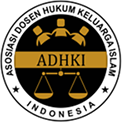- » Focus and Scope
- » Section Policies
- » Peer Review Process
- » Open Access Policy
- » Archiving
- » Article Processing Charge
Focus and Scope
Inklusif: Jurnal Pengkajian Penelitian Syariah dan Ilmu Hukum, focuses on the results of studies and reviews of literature in the fields of Economics and Islamic Law.
Scopes includes:
- Islamic law; Islamic Criminal Law; Islamic Civil Law; Islamic Family Law; Application of Islamic Law in Indonesia.
- Islamic Economics; Islamic Banking, Sharia Accounting; Issues of Contemporary Islamic Economics
Section Policies
Articles
Jurnal Editor
Editor In Chief: Jamali Syahrodi
International Editor: Aan Jaelani
Editors:
Akhmad Khalimy
Pradi Khusufi Syamsu
Peer Review Process
The practice of peer review is to ensure that only good science is published. It is an objective process at the heart of good scholarly publishing and is carried out by all reputable scientific journals. Our referees play a vital role in maintaining the high standards of  Inklusif Journal and all manuscripts are peer reviewed following the procedure outlined below.
Initial manuscript evaluation The Editors first evaluate all manuscripts. It is rare, but it is possible for an exceptional manuscript to be accepted at this stage. Manuscripts rejected at this stage are insufficiently original, have serious scientific flaws, have poor grammar or English language, or are outside the aims and scope of the journal. Those that meet the minimum criteria are normally passed on to at least 2 experts for review.
Type of Peer Review The Journal of INKLUSIF employs single blind reviewing, where the referee remains anonymous throughout the process.
How the referee is selected Whenever possible, referees are matched to the paper according to their expertise and our database is constantly being updated.
Referee reports Referees are asked to evaluate whether the manuscript: - Is original – Is methodologically sound - Follows appropriate ethical guidelines - Has results which are clearly presented and support the conclusions - Correctly references previous relevant work Language correction is not part of the peer review process, but referees may, if so wish, suggest corrections to the manuscript.
How long does the review process take? The time required for the review process is dependent on the response of the referees. Should the referees’ reports contradict one another or a report is unnecessarily delayed, a further expert opinion will be sought. In rare cases for which it is extremely difficult to find a second referee to review the manuscript, or when the one referee’s report has thoroughly convinced the Editors, decisions at this stage to accept, reject or ask the author for a revision are made on the basis of only one referee’s report. The Editors’ decision will be sent to the author with recommendations made by the referees, which usually includes verbatim comments by the referees. Revised manuscripts might be returned to the initial referees who may then request another revision of a manuscript.
Final report A final decision to accept or reject the manuscript will be sent to the author along with any recommendations made by the referees, and may include verbatim comments by the referees.
Editors Decision is final Referees advise the editors, who are responsible for the final decision to accept or reject the article.
Becoming a referee for the Journal of Choice Modelling If you are not currently a referee for the Journal of INKLUSIF but would like to be considered as a referee, please contact the editors. The benefits of refereeing for the Journal of INKLUSIF include the opportunity to read, see and evaluate the latest work in your research area at an early stage, and to contribute to the overall integrity of scientific research and its published documentation. You may also be able to cite your work for the Journal of Choice Modelling as part of your professional development requirements for various Professional Societies and Organisations.
Open Access Policy

This work is licensed under a Creative Commons Attribution 4.0 International License.
Archiving
This journal utilizes the LOCKSS system to create a distributed archiving system among participating libraries and permits those libraries to create permanent archives of the journal for purposes of preservation and restoration. More...
Article Processing Charge
Starting from Volume 9, Inklusif: Jurnal Pengkajian Penelitian Syariah dan Ilmu Hukum applies the following author fees:
1. Article Submission
Authors are not required to pay any submission or processing charges.
2. Article Publication
For accepted manuscripts, authors must pay a publication fee of Rp. 500.000,-.
Upon acceptance of your paper, you will be asked to:
- Fill out and submit a statement of originality.
- Pay the publication fee, which covers article processing and DOI maintenance.












.png)








